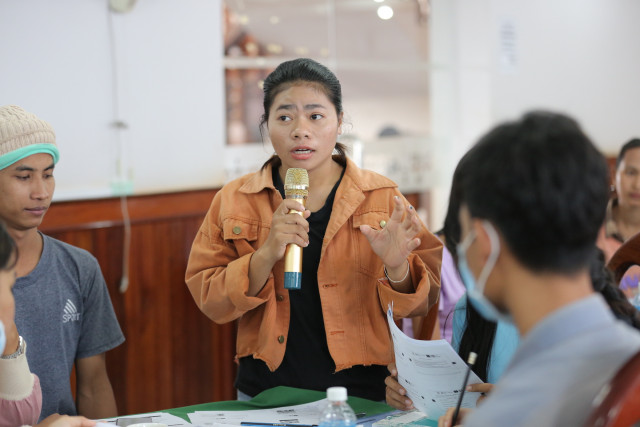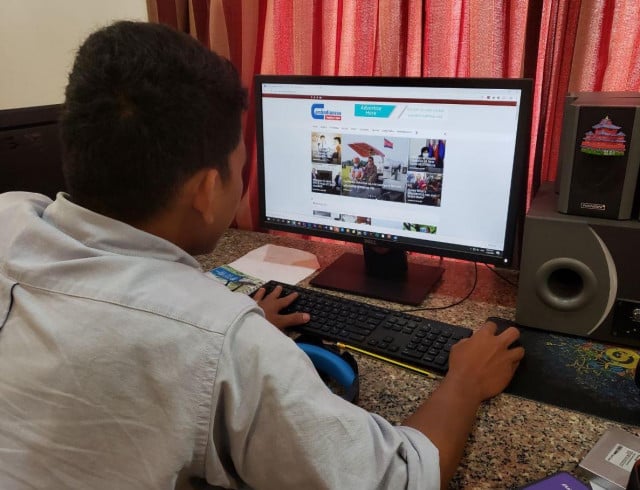One Woman’s Quest to End Child Marriages in Ratanakiri Province

- Uth Raksmey and Thien Phearin
- March 8, 2021 10:24 AM
Yern Naroth, a 19-year-old belonging to the ethnically Tumpoun community of Ratanakiri Province is campaigning to stop child marriages, which she said are robbing girls of their future.
PHNOM PENH--At 19 years old, Yern Naroth remains a rarity among her community for the simple reason that she is unmarried. But her pursuit of agency in her own life has not been easy.
“When I first told my parents, their reaction was quite typical—they wanted me to get married and they warned me that if I didn’t marry soon, they would expel me from our home,” said Naroth. At the time she was just 13 years old.
“I kept declining their proposal, because I wanted to finish my education, but my family kept pressuring me to drop out of school,” she added, noting that she is currently a 12th grade student at high school in Ratanakiri Province.
Her parents’ attitude towards child marriages is quite normal, she said, because her family belongs to the Tumpoun ethnic group—who have long married off their sons and daughters often before the age of 16 due to a range of social, economic and cultural factors.
Naroth’s decision to defy her parents’ wishes and continue studying is quite rare, she explained, particularly among Tumpoun society. Despite this and her young age at the time, she managed to convince them that marriage was something that could wait.
“Then, I started explaining to them that my marriage would impact me as young girl, if I ended up illiterate in the future, I would only be able to help farm—I wouldn’t be able to get a different job or educate my children and grandchildren,” she recalled.
Naroth’s parents, who were also married as children, did not initially agree with her, but were willing to listen as they could see the merits of an education even if it meant forgoing the traditions and marital customs of their community.
_1615199012.jpeg)
Neglect of Indigenous Communities
Some 19 percent of Cambodian girls are married before their 18th birthday, according to a 2017 report from UNICEF. The report found that 2 percent were married before the age of 15, but that much of the country’s child marriages were happening in rural areas—particularly among ethnic minorities.
There are an estimated 24 different ethnic minority groups living across Cambodia, amounting to around 200,000 people, of which the Tumpoun were believed to account for roughly 31,000 in 2006 following a World Bank study that found that overwhelming majority of Tumpoun communities were based in Ratanakiri Province.
A separate UNICEF report from 2014 stated that, based on official figures, marriage before reaching the age of 18 had dropped from 28 percent of the population to 19 percent between 1989 and 2014, but while the study was unable to disaggregate the data by ethnicity, the geographic results were quite telling.
“[T]he proportion of young women aged 20–24 who were married before age 18 shows wide variations by geographic location, ranging from a high of 36 percent in Mondulkiri and Ratanakiri regions to a low of 5 percent in the capital city, Phnom Penh,” UNICEF wrote in 2014.
The absence of reliable and updated figures is perhaps a testament to the government’s relationship with Cambodia’s numerous ethnicities. The country’s legal system scarcely recognizes the myriad indigenous people who call various parts of Cambodia home, with laws and policies pertaining to these communities relying on indistinct terminology and vague definitions—allowing ethnic minorities to slip through the gaps in terms of education, land ownership and political representation.
Fighting for Education and Empowerment
For Naroth, it’s this disempowerment that has created conditions where marriage at the age of 13 has become the norm and why, at the age of 16, she joined the Adolescent and Youth Reference Group (AYRG)—a UNICEF-led project launched in 2015 that aims to, among other things, address the prevalence of child marriage in Cambodia.
“I have helped my community through producing educational videos on the issues of child marriage and circulating the contents in the village,” explained Naroth. “After we instructed them, some parents could see that this is concerning, some of them understand that and send their children to school instead.”
Parents, Naroth has come to learn, are the gatekeepers of their children’s future and so to prevent young children from being married off before they have had the chance to determine their own fate, AYRG directs their advocacy work at the parents within the Tumpoun communities of Ratanakiri Province.
Through her role at AYRG, Naroth said she hopes to change social conventions within her community and beyond.
“Ethnic minority youth need to prioritize education,” she said. “Every girl should obtain the chance to get a higher education, which is a means through which they can gain confidence and become an independent woman making their own choices in life.”















